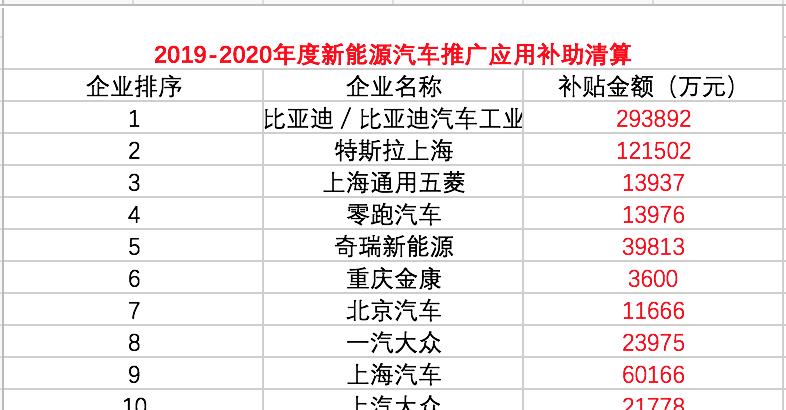On March 2, the Ministry of Industry and Information Technology said that it has carried out the liquidation review of the subsidy funds for the promotion and application of new energy vehicles in 2019-2020 and the pre-allocation and calculation of subsidy funds in 2019-2021.
Simple understanding, is to send money to new energy vehicle companies.
The liquidation involves 250,000 vehicles in 2019 and 590,000 vehicles in 2020, and after deducting the prepaid funds, 1.01 billion yuan and 2.32 billion yuan of subsidies will be issued respectively.
A number of car companies have received pre-allocated funds, take a look at it:
Tesla (Shanghai); 1.21502 billion yuan,
BYD automotive industry 1,716.66 million yuan,
BYD Automobile 1.22226 billion yuan,
SAIC-GM-Wuling 139.37 million yuan,
Zero-run cars 139.76 million yuan
Chery New Energy 398.13 million yuan,
Chongqing Jinkang 36 million yuan,
BEIJING Motor 116.66 million yuan,
FAW-Volkswagen 239.75 million yuan,
SAIC Motor 601.66 million yuan,
SAIC Volkswagen 217.78 million yuan,
GAC passenger car 838.07 million yuan.

For huge subsidies, this year may be the last year of the implementation of the new energy vehicle purchase subsidy policy, after this year, the new energy vehicle promotion subsidy policy that has been implemented in China for 12 years will officially withdraw from history.
Compared with 2021, the subsidy policy in 2022 also continues to decline by 30%, and the subsidy standard is: pure electric passenger car subsidy of 300-400 km (including 300 km) is 0.91 million yuan, pure electric passenger car subsidy of more than 400 km (including 400 km) is 12,600 yuan, plug-in hybrid (including extended range) passenger car subsidy is 0.48 million yuan.
In addition, according to the Beijing News, preliminary statistics show that by the end of 2021, the Ministry of Finance has announced the liquidation and review of 19 batches of subsidy funds for the promotion and application of new energy vehicles, with a cumulative amount of more than 140 billion yuan.
Is subsidy postponement in 2022?
Subsidies decline, and car companies will increase prices accordingly. On March 2, WM Motor announced that due to the increase in parts prices and other factors, from March 1, the scheduling plan and model price of some models of WM will be gradually adjusted.
So far, many auto brands such as Euler, Roewe New Energy, and Geometric Automobile have raised the price of their models.
The decline of subsidies has been controversial. At the enterprise level, the auto companies in the A-share listed companies, subsidies occupy an important share of profitability. At the product level, Euler black and white cat selling a loss is a phenomenon and not an isolated case. Subsidies have completely declined, which is like a flood beast for car companies.
In view of this situation, on the 28th, the State Council New Office held a press conference on promoting the smooth operation of industry and informatization and the improvement of quality and upgrading, and Xin Guobin, vice minister of the Ministry of Industry and Information Technology, said that it is necessary to study and clarify support policies such as the continuation of preferential tax treatment for new energy vehicles, optimize the "double integral" management method, do a good job in effectively connecting with subsidies to stabilize market expectations.
At the conference, Xiao Yaqing, minister of the Ministry of Industry and Information Technology, said that multiple measures will be taken to expand consumer demand, and policies such as subsidies for the purchase of new energy vehicles, incentives for charging facilities, and preferential tax reductions and exemptions for vehicles and ships will continue to be implemented.
In addition, the two will be coming. Zeng Qinghong, deputy to the National People's Congress and chairman of THE GUANGZHOU AUTOMOBILE Group, put forward the "Proposal on Improving the Subsidy Policy for New Energy Vehicles".
Zeng Qinghong believes that the implementation of the new energy vehicle subsidy policy in the mainland for many years has played a key role in the growth of emerging markets and effectively enhanced the competitiveness of the new energy automobile industry. The national subsidy slope will be stopped at the end of this year, resulting in high cost pressure on supply-side enterprises, the demand side based on the anxiety of "safety", "charging difficulties", "slow charging" and other issues, consumption enthusiasm also needs to be improved; at the same time, the overall scale of new energy vehicles is still relatively small, supporting infrastructure construction (such as charging, power exchange, etc.) still has a large room for improvement, and the long-term development of the industry has a long way to go.
He suggested that the first is to postpone state subsidies for one to two years, simplify the procedures for receiving subsidies in the early stage, and alleviate the financial pressure of enterprises.